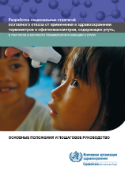Разработка национальных стратегий поэтапного отказа от применения в здравоохранении термометров и сфигмоманометров, содержащих ртуть, в том числе в контексте Минаматской конвенции о ртути. Основные положения и пошаговое руководство

Download
(English title: Developing national strategies for phasing out mercury-containing thermometers and sphygmomanometers in health care, including in the context of the Minamata Convention on Mercury. Key considerations and step-by-step guidance)
2015, vi + 14 pages
ISBN 978 92 890 5130 9
This publication is only available online.
With the adoption of the Minamata Convention on Mercury in October 2013, clear time-bound targets were set for phasing out the manufacture, export or import of a number of mercury-added products specified in the Convention: 2020 for thermometers and sphygmomanometers that are included in a wider category of non-electronic medical devices regulated under Article 4 of the Convention, with the possibility of Party-specific exemptions up to 2030. An open-ended exemption is afforded to products for research, calibration of instrumentation, and for use as a reference standard.
This publication was developed to guide health ministries in planning and leading the development of national strategies to phase out mercury-containing thermometers and sphygmomanometers in health care, including through substitution and replacement with alternatives. As the approach taken will need to be adapted to each country's needs, the measures suggested are intended to inform health ministries and their partners in these efforts about key considerations to take into account at each point in the process. The book highlights sample activities and objectives, and issues that may require more in-depth consideration: indicates the technical resources available; and provides examples of good practice.
The publication focuses primarily on national or country-wide strategies and programmes targeting health care facilities and settings, both public and private. Some reference is made to sub-national and facility level considerations as relevant. By using mercury-free thermometers and sphygmomanometers, health care facilities can make a significant contribution to reducing mercury emissions while reducing the exposure of patients and staff.



